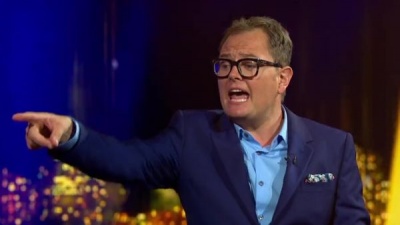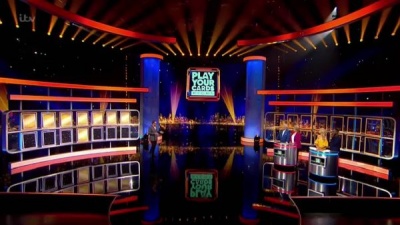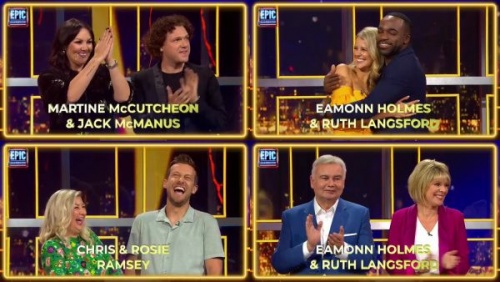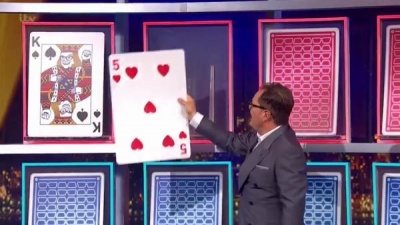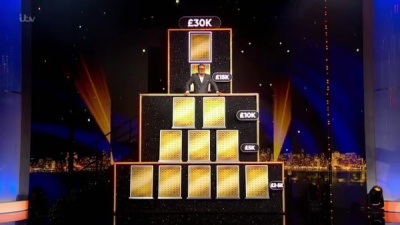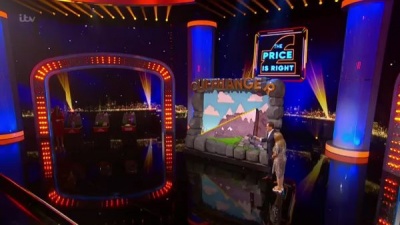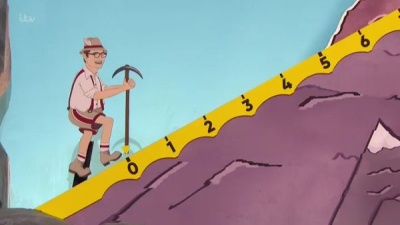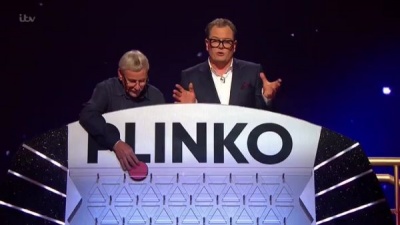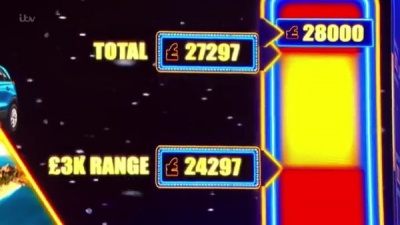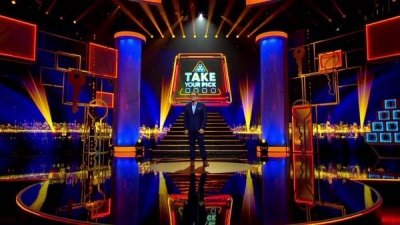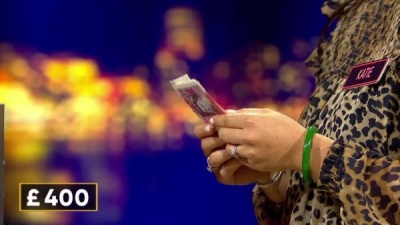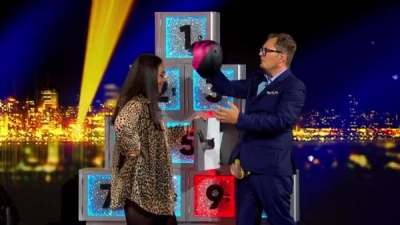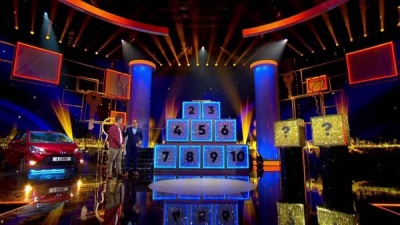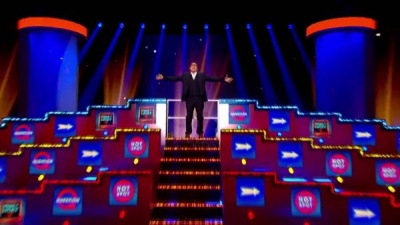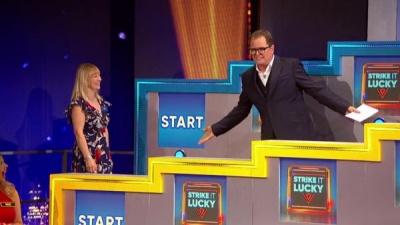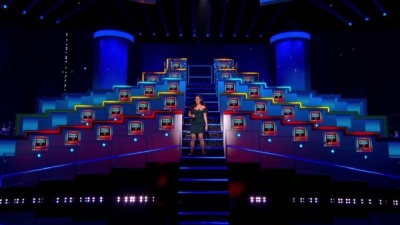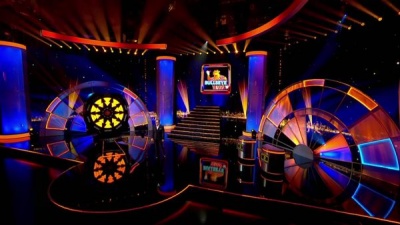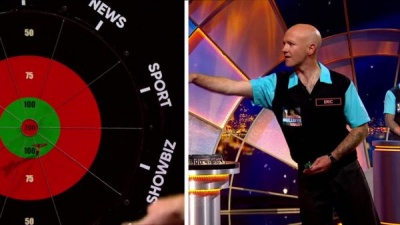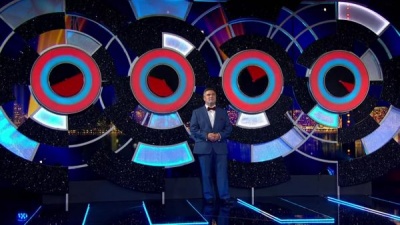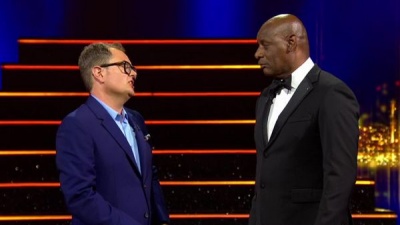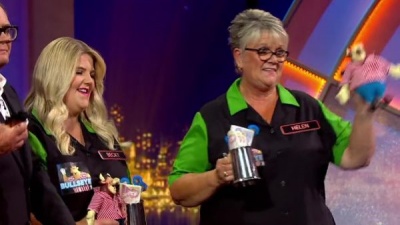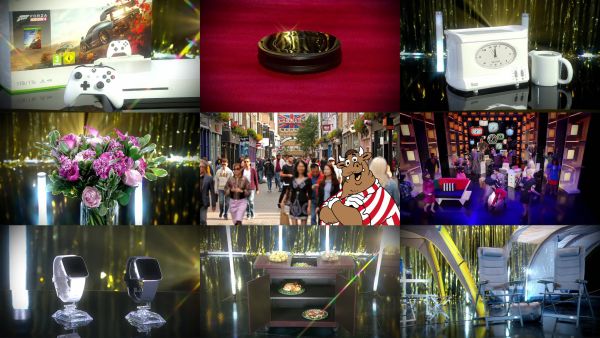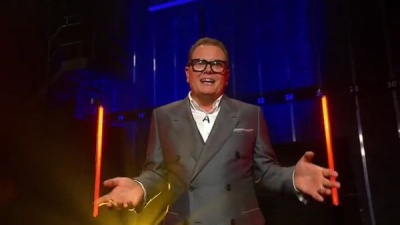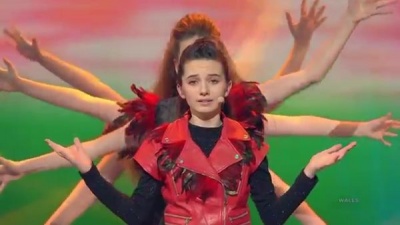Weaver's Week 2020-07-19
Last week | Weaver's Week Index | Next week
We can tell this series was recorded before the you-know-what hit. They don't even practice correct distancing in the title.
Epic Gameshow (sic)
Talkback (part of Fremantle) for ITV, 30 May – 4 July
Remember Alan Carr? It's been a couple of years since we last featured an Alan Carr programme, I Don't Like Mondays hosted by Alan Carr. Almost nothing has changed about his act in the years since: camp, obsessed with celebrity, as mainstream as the river Avon. Alan's location has changed: he's no longer a fish out of water on Channel 4, but is hosting a primetime programme on the ultra-mainstream ITV.
Now, do you remember Ant and Dec's Game Show Marathon? Back in 2005, ITV's favourite duo spent a couple of months making one-off versions of the greatest game shows seen on their channel, with a host of celebrities playing. It was a joyful celebration of ITV's heritage, to mark the channel's golden anniversary. Ant and Dec showed their ability to host almost anything, the shows were a mixture of the obvious and unexpected, and even the presence of Carol Vorderman and Eamonn Holmes couldn't eclipse the fun.
Game Show Marathon proved that Celebrity Family Fortunes was still popular, and helped persuade ITV to commission a new series – it ran for years. Game Show Marathon itself was recommissioned for a second series, though Vernon Kay proved not to be as adaptable as Ant and Dec.
The meeting of Game Show Marathon with Alan Carr has produced this Epic Gameshow (sic) series. Psst. It's "game show". Two words. It's both a game, and a show.
"A super-sized version of one of the nation's favourite game shows"
Celebrity Play Your Cards Right was the first we saw of the series, and what a line-up of celebrities they had! Ore Oduba! Chris Ramsey! Game Show Marathon regular Eamonn Holmes!
Survey questions give Alan a chance to be slightly smutty with his contestants. "Have you ever used your partner's toothbrush?" Er, to brush your teeth, right? Then it's the higher-or-lower interlude, which seemed to have an awful lot of pairs. The King cards were designed to look like Alan Carr, complete with specs.
Two pairs of teams played, then another two pairs. In old money, that's two part ones. The winning couples went through to the Seven Card Eliminator. After one final survey question to work out control, we march along the run of seven cards. Right call of "higher" or "lower" keeps control, wrong answer transfers it to the opponents. Whoever's got control after the final card is turned over, they're the winner. Yes, it's possible to win this round by default, if your opponents mess up the final call.
There's something new for the money cards: work along a row of five cards to win £2500, another three cards doubles it to £5000, another two cards to £10,000. Make three errors and it's game over, there are three spare cards to use as replacements. Survive to this point, and the turn of one card takes you to £15,000, and then the jackpot of £30,000.
The little things were wrong. When they reveal the number answers to the surveys, they don't have a screen in the middle, but hodge it into one of the players' screens. It looks cheap. So do the cards, which looked and sounded flimsy. Back in the 1980s, we could hear the sharp report of a card landing on the set; in the 2020s, the sound is a damp wobble.
Can our opinion come on down?
Episode two was The Price is Right. Voiceover is by John Sachs, who we remember as the honest voice from Gladiators, and as the host of the amazing Four Square. One of those is ripe for a revival on primetime, and not only because Atlaspheres forces proper physical distancing.
Now, we've reviewed The Price is Right a lot. Leslie Crowther's original, Bruce's revival, Joe Pasquale's effort, even Bob Warman's effort that no-one saw. Compared to all of the others, this effort lacked pace: Alan Carr leaves huge gaps in the Contestants' Row rounds, while the players confer with their friends in the audience. We're not here to see the back of Madge from Montrose's head, we want to see people win! Let us see people win!
And we've reviewed Alan Carr's last effort, a bizarre Christmas season pilot on Channel 4. Second time around, he's improved. Alan doesn't need to call people down, that's John Sachs' job. The yodelling music for Cliffhanger, present and correct. Familiar title music? Perhaps not familiar, but it's catchy enough to stick in our head.
Hole In One, always Bruce's favourite game because it's based on Bruce's favourite game. Two coffee machines in consecutive games? Any Number is familiar, and easy to understand, and easy to follow.
Thanks to lax regulation in force since 1991, every prize can be sponsored, and every prize has to be sponsored. Thanks to ITV's limited budgets, there's not a car in every game, only the showcase. Thanks to some slightly tedious prize acquisitions, almost all the major prizes were white goods, fridges and freezers and coffee makers. The raw cash of Plinko was a welcome change.
Spin the wheel, which is presented honestly – none of the disguised split screens we saw on Alan's last show. And only three players spin the wheel, not all five to come out of Contestant's Row. Excellent choices. And it's entirely fair to go for a fixed range to win the Showcase Finale: up to £3000 under, not a penny over.
But when we thought this show was near perfect, they mess it up with the prize reveal. The bid goes up a column, like an inverted Pointless, up and up and up. And through the roof. It's confusing, and it's far too small on screen. While the rest of the episode had been clear and simple to follow, this was unnecessarily complex.
Pick Me!
Take Your Pick came next, a show we've not seen since the 1990s when Des O'Connor was in charge. Does that mean Alan Carr is being groomed for Countdown in about ten years?
The show begins with a Yes-No Interlude, where contestants are challenged to talk to Alan Carr for a minute without saying "Yes", "No", nodding or shaking their head, or making huge pauses. We would have hoped that Alan would be at his best in this section, but it turned out that his is not a swift wit. Alan is able to ask the difficult question to his celebrity guests, but he's less able to improvise on the spot.
"What's your job?" "What's your star sign?" "What's your favourite food?" We've no problem if Alan uses cue cards – anything to keep the contestant talking – but the point of the Yes-No Interlude is to keep the contestants talking. It's not a space for Alan to do his comedy turns. But if the contestants can goad him into reacting, shut him up and advance the clock, then more power to their elbow.
After the Interlude completes, we meet the top six contestants in descending order of their performance. There's a more relaxed chat, where the contestant can say what they like. Alan is at home here, yakking with the contestants about their dreams and experiences. Then there are four simple general knowledge questions – our player needs only get three right to progress.
Then pick one of the ten keys to open one of the boxes in the pyramid. In some of the boxes are decent prizes – electric scooters, a laptop, a short break abroad. They're all worth many hundreds of pounds, perhaps £1000. In a few of the boxes are booby prizes, such as a used toothbrush. Alan offers money to buy the key back, starting at £200, and perhaps rising to £500. The contestant can take the cash in their hand, or they can play on to open the box.
What's the best strategy here? Is £300 in hand more valuable than a prize worth on average £600? What about, a little later, £500 in hand versus an average prize of £550? What would you do? What will the contestant do?
When each box is opened, all it contains is a small token. A helmet, or some toothpaste. It allows the audience to think "oh, crumbs, they've turned down the money for this worthless bag". And then Alan surprises us and says "a bag for your laptop!" If they're going to make a series out of this, Alan would need to mix up the reveals a little.
Each player picks a coloured key for the endgame. One of the boxes conceals the words "Epic Endgame", and that player will progress to the final round. Pick one box from each row on the pyramid, and one of the golden prize boxes to go on top.
After opening the boxes from the lower three rows, the winner can take their prizes, or they can play on to win all the good prizes and a brand new car. And there may be an option to swap the golden boxes. This final bit is drawn out, and it's drawn out a moment too long. Some of the chat with the main game contestants before they opened their boxes was perfunctory, and they've chosen to edit down the chat to fit in more "tension" here.
Watching this back, we're struck by how Take Your Pick hits many of the same beats as Deal or No Deal. It's a game of value, whether sure money is more useful than a prize of uncertain value. In part, it's a game of pure luck; in part, a game of beating the host at his own game. The new endgame adds a clear conclusion to the programme, we're building up to a proper climax, it doesn't peter out after the final contestant. While better than either of the earlier shows, Take Your Pick still doesn't feel a perfect fit for Alan Carr.
Put yourself on the hot spot
Strike it Lucky was episode four, and – according to Alan's script – it was the sixth most-watched show on telly. Its modern equivalent, as the sixth most-watched show on telly, is Epic Game Show. Whatever this column might say, Epic Game Show has been popular with the audiences, albeit in a time when no programme gets huge audiences.
There's hardly anything to get wrong with Strike it Lucky, the format plays itself. Three teams, work along a bank of monitors, choose whether to stop and bank the prizes or to play on and risk losing them in a hot spot. Alan Carr's version hit all the format points: a long chat with the players before we started, an elderly contestant who perhaps didn't keep up with the pace of the show. There are simple questions, though there's always a contestant a tad more simple than that.
Alan might have been under orders to draw out the main game, or the editors might not have needed to cut out as much material as last week. Either way, the main game moved at a stately pace – never too quick, but never too slow.
Two teams completed their board, and played on in the "head-to-head". It's the final round from the old series. The teams chose a sequence of moves. Top, middle, or bottom? Whoever got across the board with the fewer hot spots was the winner.
The final game continued the triangular motif we'd seen in all the finals so far. Bigger prizes at each level of the board, starting with another set of electric scooters and finishing with a trip to Las Vegas. Find three hot spots on your journey and it's game over, and all prizes in this game are lost, as turned out to happen.
Strike it Lucky remains a format as thin as tracing paper, and it made for sluggish viewing. There's nothing wrong with slower shows, not everything has to be as fast as The Price is Right.
Dangling dice
Week five was another Play Your Cards Right, with civilian players.
The series finale was Official Joint 17th Best Game Show Of All Time Bullseye. (It holds the honour with Catchphrase.) "The very real chance that someone living on the 16th floor of a tower block might be going home with a speedboat," summarised Alan. Not with this week's contestants, in the first round they seemed to have particular difficulty hitting the right part of the board.
Four couples took part in the category board, split into two heats of two. Ten categories – and they're not the ones from the past. Famous Alans is new for this show, then News, Sport, Showbiz, Science, History, Books, World, Britain, and Spelling. Values of the rings were £50, £75, £100, and £200 for the bullseye; the questions were for £50, £75, and £100 in successive rounds. The losing couple in each round take the money they've won, plus the traditional consolation prizes: tankards, a set of darts, bendy Bullys, and the money they've won.
The winners go through to Pounds for Points, the higher score wins the question, and that many pounds for a correct answer. In a vain effort to inject some interest into the dregs of the round, they made the final question for double money. It went to the leaders anyway.
Our winners go through to Bully's Prize Board, filled with the usual variety of high- and low-quality prizes like a hostess trolley, flowers every week for a year, a weekend in London, and a teasmaid.
But there's more to be won: the star prizes. A brand new telly, a bathroom installation, a trip to Mexico, and a brand new car. So that they could plug all the sponsors, the prizes were announced before the players got to start the game. It removes the big reveal, the surprise of seeing what's behind Bully.
The endgame itself was decent: hit the red section of a spinning dartboard. They've got six darts to use, and the winning sectors get smaller on each board. After our players hit with their first three darts, they play on for the car, but miss with all three. Alan offers an extra dart, but it'll cost them the teasmaid, and our players use this extra dart to win.
"If your idea of excitement is watching a tv audience spontaneously combust at the prospect of guessing how much a cordless popcorn machine costs, then you're in the right place."
Each show featured a special guest. Sam Brown was the Play Your Cards Right dealer. The Price is Right featured prize demonstrators Matt Peacock, Rachel Trevaskis, and Kimberley Williams. Shaun Wallace from The Chase kept time on Take Your Pick. Strike it Lucky had a co-producer credit to Kline and Friends. Bullseye was graced by Richard Ashdown, a professional darts scorer, and an excuse for Alan to poke fun at Richard's apparent diminutive stature.
Alyn Ainsworth's original music was exactly what we'd expect, loud and pulsing and upbeat and major key. They used the original themes where they could, or similar re-orchestrations where the original wasn't available. We never knew Strike it Lucky had a middle eight, we'd only ever heard the top and bottom.
What do we make of Laura Gibson and Charlie Bennett's format? Epic Game Show stands and falls with Alan Carr. This column doesn't particularly like Alan Carr, his performances seem to be Julian Clary without the snark. For many other people, Julian Clary without the snark is exactly right, a throwback to the glory days of Larry Grayson.
The loose thread linking all shows together was the triangle endgame. The cards, the screens, the boxes, and the targets to throw at. This endgame succeeded to give us plenty of decision points, the opportunity to take a prize or risk it for something better. But in each case, it felt bolted on, an addition to the format. Only Play Your Cards Right felt like it could be a natural conclusion.
We also note how the lower-tier prizes left us thinking, "meh". It felt like they'd come up with a budget, and spent it all on a limited range of products. Furniture and scooters, coffee makers and more white goods than we care to think about.
Epic Game Show wasn't made for the game show fandom. This column agrees with the apparent consensus amongst fans: Take Your Pick worked well for Alan Carr, and it's the only show where the extra time was used well. There's little to go wrong on The Price is Right, but there's little any presenter can do to influence the format, it proved to be bigger than Bruce Forsyth.
Play Your Cards Right felt long and drawn out, Strike it Lucky invented a new finale that didn't work, and Bullseye threw away a good beginning with a loose endgame. We note that all three of these shows were half-hour programmes, and often had to be extended to fill the original half hour. Trying to pad out the programmes to a full hour made them too slow and too tedious.
But we come back to the final point. Epic Game Show has proven to be popular. The thick end of 5 million viewers every week, and behind only Coronation Street, Emmerdale Farm, Celebrity Masterchef, The News, and Celebrity Gogglebox. That's a great success, and we shouldn't knock it. Looks like Alan Carr could have found his new home, folks.
In other news...
Rock revolution Michael McIntyre moves into the world of game shows with The Wheel, made by Hungry McBear Media. According to a BBC press release, "each episode sees a mixture of great contestants, celebrity guests and laugh out loud moments as The Wheel brings a brand new spin to Saturday nights on BBC1." The presser goes on about big money, celebrity experts, and not too many puns. We're promised ten episodes of this.
Junior Euro Streams S4C have decided not to send an entry to this year's Junior Eurovision Song Contest. It's a shame, but we understand that S4C need to protect their core mission in Wales. A similar argument explains the absence of ABC Kids from Australia.
Who's Got Talent Simon Cowell has bought out the entire Got Talent and X Factor formats, paying an undisclosed sum of money to co-owners Sony Music Entertainment. The shows have found such hugely successful talents as Sue Son, Maria Lawson and The Flying Bebop, Jonjo O'Kerr, and Eurovision experts Jedward.
BAFTA Craft Awards were announced on Friday night. David Bishop, Vicky Gill, Andy Tapley, and Patrick Doherty of Strictly Come Dancing won the Entertainment Craft award.
A quiet week for game shows looms. Bake Off The Professionals (C4, Tue) is at the semi-final stage, and Glow Up (BBC2) is iconic.
Photo credits: Talkback (part of Fremantle), EBU/BTRC.


